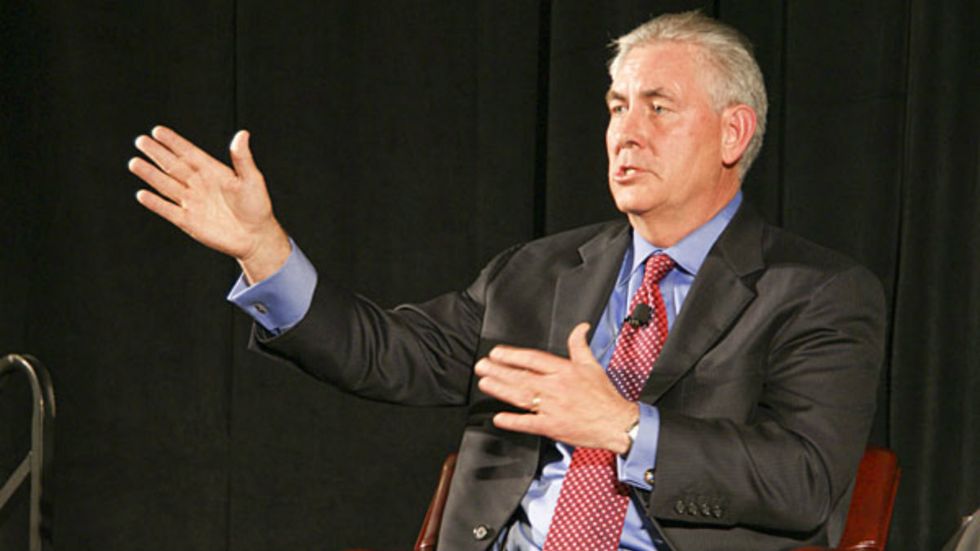
© 2024 Blaze Media LLC. All rights reserved.
Over the weekend, Secretary of State Rex Tillerson appeared to publicly renege on President Trump’s campaign promise to move the American embassy in Israel from Tel Aviv to Jerusalem. Instead of moving the embassy to Israel’s capital of Jerusalem (almost every overseas American embassy is in the host country’s capital), Tillerson floated the potential move as a bargaining chip as part of a peace deal with the Palestinians.
"Well, the president, I think rightly, has taken a very deliberative approach to understanding the issue itself, listening to input from all interested parties in the region, and understanding, in the context of a peace initiative, what impact would such a move have," Tillerson said concerning the embassy dilemma on “Meet The Press” Sunday.
In making those comments, Tillerson seems to be ignoring whether moving the embassy would be in the best interests of the United States. Instead, he buys into the Washington establishment foreign policy narrative that somehow the move would become a detriment to a “peace initiative.” Additionally, he all but ignores the fact that the Palestinian territories are governed by terrorists and terror-supporting regimes, while Israel is a free state and one of the few stable, reliable American allies in the Middle East.
The administration’s promise, which has yet to be fulfilled, comes just as President Trump is set to jet off to the Middle East for a week to meet with Arab, Israeli, and European leaders.
Tillerson, a secretary of state with no diplomatic or government experience, continued to stumble his way through the interview, referring to a nonexistent “Palestine.”
"The president has recently expressed his view that he wants to put a lot of effort into seeing if we cannot advance a peace initiative between Israel and Palestine," Tillerson added. "And so, I think in large measure the president is being very careful to understand how such a decision would impact a peace process.”
Tillerson’s harmful comments not only infuriated supporters of Israel, but they garnered a direct response from the office of Israeli Prime Minister Benjamin Netanyahu. The Israeli leader argued that keeping the embassy where it is in Tel Aviv is actually a detriment to peace, and empowers the Islamic totalitarians who seek to delegitimize Israel’s claims to its land.
PMO statement on Secretary of State Tillerson's remarks:
— PM of Israel (@IsraeliPM) May 14, 2017
Israel's position has been stated many times to the US administration and the world
Moving the American embassy to Jerusalem would not harm the peace process.
— PM of Israel (@IsraeliPM) May 14, 2017
It would advance it by correcting an historical injustice and shattering the Palestinian fantasy that Jerusalem is not the capital of Israel
— PM of Israel (@IsraeliPM) May 14, 2017
It’s unclear whether Tillerson is reflecting the viewpoint of the president, or simply discussing how he sees the embassy move in the grand scheme of his vision for the Middle East. How much influence Tillerson has over the president’s policies also remains a mystery. But his capitulation won’t surprise those who knew Tillerson before he became America’s chief diplomat.
When Tillerson was nominated for secretary of state, Conservative Review was one of the few news outlets to report on his ties to despotic Arab nations, some of which do not even recognize Israel’s existence.
As CEO of ExxonMobil, Tillerson was very enthusiastic about his company’s strong relationships with the autocratic monarchies in Saudi Arabia and Qatar, two countries which also have heavy-handed political interests in the Middle East. Tillerson has met with the Qatari head of state countless times within the past couple of years. Both governments have attempted to push the United States towards adopting specific policies when it comes to the Arab-Israeli conflict and several flare-ups in the region.
Moreover, Tillerson’s most ferocious promoters, such as James Baker, Condoleeza Rice, and others, long believed that America was right to try and impose a two-state solution on Israel and the Palestinians, instead of letting the two parties engage in direct negotiations.
Since becoming secretary of state, Tillerson has received widespread criticism for failing to “drain the swamp” of prominent Obama administration holdovers who damaged the U.S.-Israel relationship. Tillerson has tasked Michael Ratney, a close confidant of former Secretary of State John Kerry, to run the Israeli-Palestinian portfolio at State. The former ExxonMobil executive has also kept in place prominent proponents of the Iran nuclear deal, and has left them in charge of key oversight positions concerning the Iranian regime’s nuclear program.
Want to leave a tip?
We answer to you. Help keep our content free of advertisers and big tech censorship by leaving a tip today.
Want to join the conversation?
Already a subscriber?
more stories
Sign up for the Blaze newsletter
By signing up, you agree to our Privacy Policy and Terms of Use, and agree to receive content that may sometimes include advertisements. You may opt out at any time.
© 2024 Blaze Media LLC. All rights reserved.
Get the stories that matter most delivered directly to your inbox.
By signing up, you agree to our Privacy Policy and Terms of Use, and agree to receive content that may sometimes include advertisements. You may opt out at any time.


